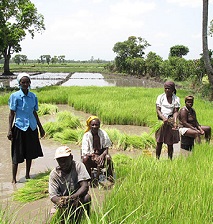
Women Farmers and Land Grabs in Haiti: An Interview With Iderle Brénus
"In Haiti, the majority of the people working the land are women. Not only are they there during planting, weeding and harvesting, but they also play a role in transforming and marketing food products. They're involved in the entire agricultural production process. This is why we call women the poto mitan, central pillar, of the country." - Iderle Brénus


